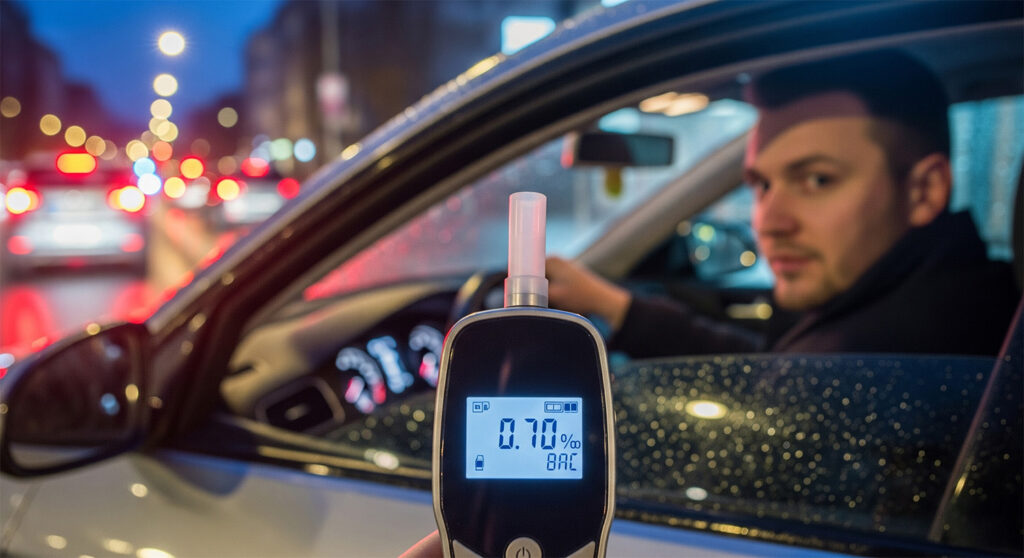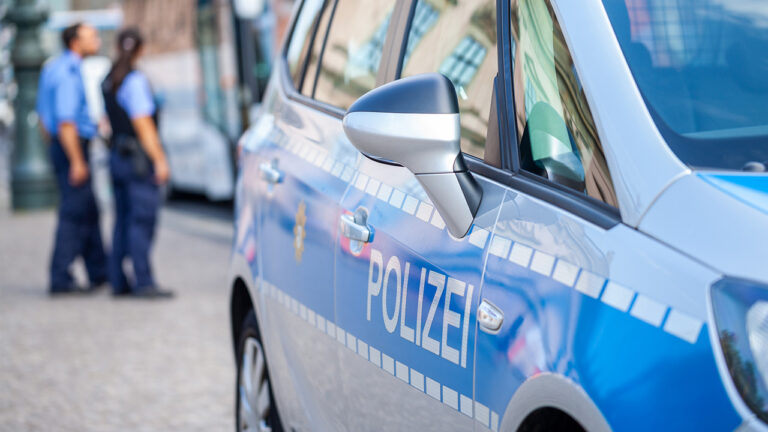Anyone who causes an accident under the influence of alcohol can expect severe consequences: In addition to heavy fines, there is also the threat of points, driving licence disqualification, insurance recourse claims and even imprisonment. From 0.3 per mille, a fine can be imposed - from 1.1 per mille, you are considered to be completely unfit to drive - and your driving licence is usually taken away.
In this guide, you will find out what penalties and consequences you will face in the event of an accident involving alcohol - and what you should do as the injured party if the other party was drunk.
- Drivers - ATTENTION: also cyclists! - exceed the permitted blood alcohol limit. The 0.0 per mille limit applies to novice drivers.
- In addition to hefty fines of 500 to 1500 euros, a drink driving offence can even result in a prison sentence!
- If an accident occurs due to drink driving, the driver concerned must expect their driving licence to be revoked. This then applies for at least six months.
- The mere fact that you have consumed alcohol does NOT automatically mean that you are at fault for the accident. You can be sure of a fine, but the question of fault remains to be clarified objectively.
Why does alcohol contribute to a road accident?
When you are drunk, your perception is limited and it takes longer to process the already reduced perceptions, which means that your reactions are not only slower, but also of poorer quality. Your own spatial perception is also significantly weakened. However, these are precisely the skills that are particularly important in road traffic. Therefore, driving under the influence of alcohol is always a danger to yourself and others.
In addition to the intoxicating effects of alcohol consumption, the following side effects also occur:
- increased sensitivity to light: they are more likely to blink
- Increased willingness to take risks: you drive more riskily
- impaired and blurred vision: You recognise too late
- Selective perception: you no longer see some things at all
- Extended reaction time: you brake too late
All these side effects increase the likelihood of you getting into a car accident. In the worst case scenario, you may even have an accident involving alcohol that results in personal injury. No drinking occasion in the world is worth this level of personal suffering!
Accident victims like you get the best support from fairforce.one.
Have your accident reported now free of charge and without obligation by our regulation specialists.
What are the blood alcohol limits in the event of a road accident involving alcohol?
You have probably heard that there is a 0.5 per mille limit for drivers in Germany. However, this does not mean that you cannot be prosecuted if you have less alcohol in your blood. In short, if you are relatively unfit to drive, you are likely to lose your driving licence from 0.3 per mille to 1.09 per mille if there are additional circumstances. In the case of absolute unfitness to drive from 1.1 per mille, driving licence withdrawal is certain even without further circumstances.
The situation is similar for cyclists, but the legal absolute inability to drive only begins at 1.6 per mille.
As a pedestrian, you have no fixed drink-drive limit. But did you know that your driving licence can be revoked even as a pedestrian if you are caught drinking in public?
Blood alcohol limit during the probationary period
If you are still on probation or under the age of 21, you are subject to the 0.0 per mille limit. This means: no alcohol at the wheel - no "beer", no spirits, no "Verdauerli"!
Relative unfitness to drive means that drivers must be able to realistically assess whether they are still able to drive a car safely. If you make the wrong decision, you could face fines, points in Flensburg and a driving ban. If you even have an accident while driving under the influence of alcohol, you are immediately liable for a criminal offence, i.e. the penalties under the German Criminal Code (StGB) apply. The only criterion for absolute unfitness to drive is your blood alcohol level. If the above-mentioned blood alcohol limit of 1.6 is exceeded, you are no longer legally able to drive a vehicle, no matter how fit you feel.
Overview: Blood alcohol limits for road users in Germany
| Sanction-free area | Relative unfitness to drive | Absolute inability to drive | |
|---|---|---|---|
| Drivers | In the Trial period and for young adults under the age of 21: 0.0 per mille. After the probationary period and for over 21-year-olds: up to 0.29 per mille. | From 0.3 per mille to 1.09 per mille in conjunction with other circumstances. Driving licence revocation likely | From 1.1 per mille. Driving licence is revoked |
| Cyclist | Up to 0.29 per mille. | From 0.3 per mille to 1.59 per mille in conjunction with other circumstances. Driving licence withdrawal likely. | From 1.6 per mille. Driving licence will be revoked. |
| Pedestrian | There is no alcohol limit. However, a driving licence may be revoked if you are seen in public under the influence of alcohol. | – | – |
Car accident with alcohol - these high penalties apply
If you have caused a car accident while under the influence of alcohol, you can expect severe penalties. As you may no longer have been able to drive a vehicle, you have inevitably endangered traffic. The fines for drink-driving are already high - between 500 and 1500 euros are typically due. However, if you cause an accident while drunk, you are no longer committing a comparatively harmless misdemeanour, but a serious criminal offence under § Section 315 c StGB.
If you have caused an accident while under the influence of alcohol with a blood alcohol level of 0.3 per mille, you could be given three points in the driving aptitude register and have your driving licence revoked. But that's not all. There is also a fine or prison sentence. § Section 315c of the German Criminal Code (StGB) provides for a prison sentence of up to five years for alcohol consumption and the resulting endangerment of life or limb of another person or property of significant value. In order to get away with just a fine, you need mitigating circumstances.
However, the fact that a driver has been involved in an accident under the influence of alcohol does not necessarily mean that they are at fault. If even a sober driver would not have been able to prevent the collision - for example because someone behind them causes a rear-end collision - the drunk driver in front is not actually at fault. The decisive factor for the question of fault is always the circumstances of the accident. Nevertheless, every drunk driver must expect a fine or criminal proceedings.
Accident with alcohol: How long is the driving licence lost?
If you have caused an accident with alcohol in your blood, your driving licence will usually be revoked for at least six months. However, the disqualification period can also be set longer by the authorities.
Often, a medical-psychological examination - the often-cited MPU, also known as the "idiot test" - must also be completed before the driving licence withdrawal is terminated. The court order for an MPU is decided on a case-by-case basis. The order is possible from a blood alcohol level of 1.1 in the person responsible for the accident. From a blood alcohol level of 1.6, the reinstatement of the driving licence is often linked to successfully passing this test. In the event of an accident involving alcohol, it is therefore very likely that your driving licence will be revoked. You will then need valid arguments (e.g. the threat of losing your job if your driving licence is withdrawn) and an appropriately knowledgeable specialist in traffic law at your side.
Accident involving alcohol: What if I'm not at fault?
If you are involved in an accident as the injured party, it is important to document the accident as accurately as possible. This applies all the more if it is suspected that alcohol or other intoxicating substances were involved! In this case, it is best to inform the police. On the one hand, they can officially establish that the person who caused the accident has consumed alcohol. On the other hand, the police will also take the correct measures to document the blood alcohol level for a possible court hearing. When answering the question of guilt, alcohol consumption is a strong indication that the alcohol consumer was probably also at fault for causing the accident. However, this must be examined on a case-by-case basis and should not be left to chance:
Report your accident free of charge and with just a few clicks via fairforce.one. You will receive a qualified lawyer's initial assessment of the question of fault within 24 hours of providing the necessary data. It is quite possible that an accident may have happened with alcohol, but that you were not actually at fault.
Accident victims in your situation simply get the best support from fairforce.one.
Accident with alcohol: Does the insurance pay?
As drink-driving is legally classed as grossly negligent or even intentional behaviour, insurance companies can refuse to accept liability in these cases, either in part or in full. This usually depends on the alcohol concentration in the blood at the time of the accident. As the person responsible for the accident, you are typically affected by the following reductions in insurance benefits in practice
- Less than 0.3 per mille: As a rule, the accident victim's damages are paid in full.
- Between 0.3 and 1.1 per mille: Up to 50 % reductions can be made.
- Over 1.1 per mille: A complete refusal to pay is possible.
Good to knowThe possible deductions listed also apply to other insurances - such as your comprehensive insurance - if alcohol was the cause of the accident.
Steps towards fair claims settlement
Call us now free of charge at 0800 - 30 111 60 or have your claims checked directly online!
At fairforce.one, we give you the assurance that your matter will be examined and competently resolved for you exclusively by proven, customer-orientated traffic and insurance law specialists.
Contact us with just a few clicks and we will help you further. The fairforce.one network will enforce your claims and support you personally in all matters right through to full payment.
This is exactly why we founded fairforce.one. And that's exactly what has made us Germany's road accident settlement portal with the best customer ratings.
Frequently asked questions about drink-driving
At what blood alcohol level is there a risk of driving licence disqualification after an accident?
Driving licences can be revoked from as low as 0.3 per mille - if there are also signs of impairment or an accident. From a blood alcohol level of 1.1 per mille, you are considered to be completely unfit to drive and your driving licence will be revoked in any case, regardless of your driving behaviour.
learn moreWhat are the penalties for an accident involving alcohol?
In addition to fines of up to €1,500, there is also the threat of three points in Flensburg, a driving ban or driving licence disqualification and - depending on the severity of the accident - even a fine or prison sentence in accordance with Section 315c of the German Criminal Code (StGB). This can be particularly serious in the case of personal injury.
learn moreDoes the insurance pay out in the event of an accident under the influence of alcohol?
In many cases only partially or not at all. At up to 1.1 per mille, your car insurance can reduce benefits. If the value is higher than this, it can refuse to pay completely - both in liability and comprehensive insurance.
learn moreWhat happens if I am involved in an accident while drunk but am not at fault?
Drinking and driving leads to consequences regardless of who is at fault. Even if you are not responsible for the accident, you may be fined and banned from driving. The question of fault must always be clarified objectively - ideally with the support of a lawyer.
learn moreDo novice drivers have to expect stricter consequences for alcohol-related accidents?
Yes, the 0.0 alcohol limit applies to novice drivers under the age of 21 and in the probationary period. Even the slightest consumption of alcohol leads to an offence with a fine, points in Flensburg, extension of the probationary period and a mandatory advanced training seminar - and in the event of an accident, even harsher penalties.
learn more




